仁爱英语八年级下册Unit7-Topic2 Section A
仁爱英语八年级下各单元短语归纳完整版

仁爱英语八年级下各单元短语归纳集团标准化办公室:[VV986T-J682P28-JP266L8-68PNN]Unit5TopicOne1.lookexcited看起来兴奋,激动2.feelhappy/disappointed感到高兴/失望3.tastedelicious/good尝起来美味4.soundwonderful/sweet/great听起来精彩/甜美/好,不错5.smellterrible闻起来恶心6.gomad/bad发疯/变坏7.turngreen/yellow变成绿色/黄色8.bepopularwithsb.受某人欢迎9.seem(tobe)unhappy似乎不高兴10.seemtodosth.似乎做,好像做11.gotothemovies=gotoseethemovie去看电影12.invite/asksbtodosth邀请某人做某事13.invitesb.to+sp.邀请某人去/参加…14.oneof+最高级+pl.最…之一15.preparesthforsb=preparesb.sth.为某人准备好某事16.preparetodosth.准备做17.saythanks/hello/sorry/goodbyetosb向某人说声谢谢/你好/抱歉/再见18.Whatashame/pity.真遗憾。
19.get/buytheticketto/for买到…的票20.beabletodo=can/coulddo能够做…21.willbeabletodo将会做…22.onthe/one’sway to在去往…的路上23.onthewayhome/here/there在回家/去这儿/那儿的路上24.rightnow/away=atonce立即,马上25.feel/besorryfor(doing)sth为(做)某事感到抱歉/遗憾/难过26.beangrywithsb.对某人生气27.justnow=amomentago刚才(用于过去时)28.carefor=takecareof=lookafter照顾29.becauseof+n.因为…,由于…30.because+句子因为…,由于…31.cheersbup=makesb.Happy使…兴奋起来32.atlast=intheend=finally最后,最终33.attheendof…在…的末尾/尽头34.atfirst起初,开始smilingfaces笑脸35.noisychildren吵闹的孩子们36.lovelysongs活泼的歌曲37.livealone独居be/feellonely感到孤独38.teachsb.todosth.教某人做39.teachoneselfsth.=learnsth.byoneself自学…eintobeing=beborn出现,形成41.fallinto落入,掉入lookfor寻找42.everywhere=hereandthere到处43.bewithahistoryof200years=haveahistoryof200years=have200 yearsofhistory有着两百年的历史eintobeing=beborn形成efrom=befrom来自46.moreandmore+n./原级越来越来…47.be/becomeinterestedin(doing)sth.对…感兴趣48.makepeacewithsb与某人和解49.findawaytodo/ofdoingsth.找到做…的方法50.Itseems/seemedthat+句子。
仁爱英语八年级下 Unit 7 Topic 2 重点短语、重点句型、难点辨析,语法详解
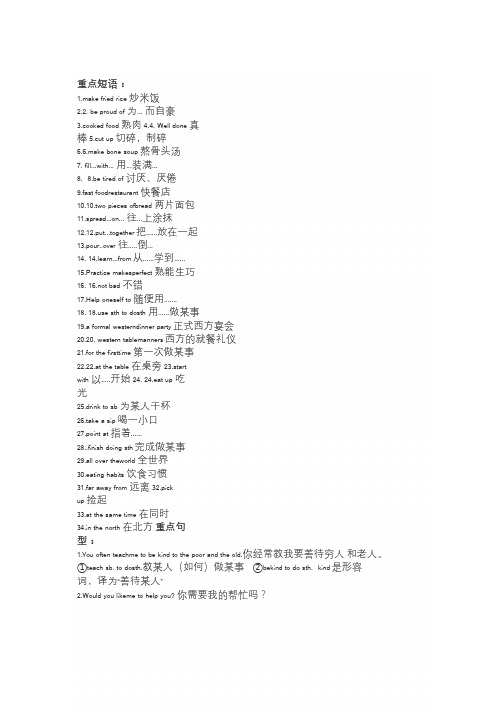
重点短语:1.make fried rice 炒米饭2.2. be proud of 为... 而自豪3.cooked food 熟肉4.4. Well done 真棒 5.cut up 切碎,制碎6.6.make bone soup 熬骨头汤7. fill...with... 用...装满...8. 8.be tired of 讨厌、厌倦9.fast foodrestaurant 快餐店10.10.two pieces ofbread 两片面包11.spread...on... 往...上涂抹12.12.put...together把......放在一起13.pour..over 往.....倒...14. 14.learn...from从......学到......15.Practice makesperfect 熟能生巧16. 16.not bad 不错17.Help oneself to 随便用.......18. e sth to dosth 用......做某事19.a formal westerndinner party正式西方宴会20.20. western tablemanners西方的就餐礼仪21.for the firsttime 第一次做某事22.22.at the table 在桌旁 23.startwith 以.....开始 24. 24.eat up 吃光25.drink to sb 为某人干杯26.take a sip 喝一小口27.point at 指着......28..finish doing sth完成做某事29.all over theworld 全世界30.eating habits 饮食习惯31.far away from 远离 32.pickup 捡起33.at the same time 在同时34.in the north 在北方重点句型:1.You often teachme to be kind to the poor and the old.你经常教我要善待穷人和老人。
仁爱英语八下教案
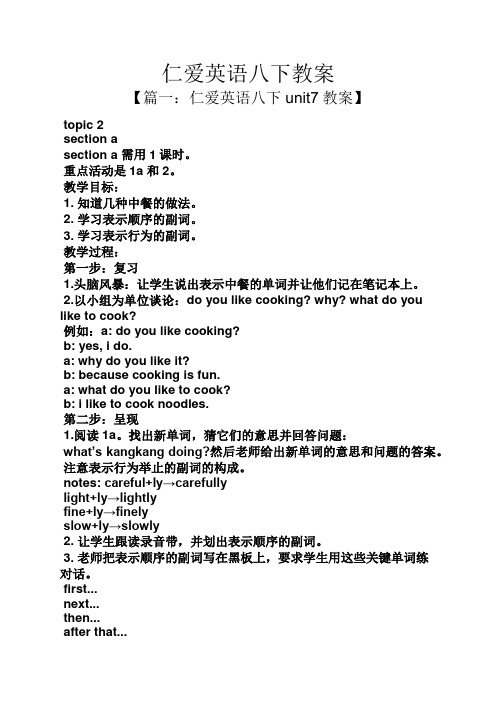
仁爱英语八下教案【篇一:仁爱英语八下unit7教案】topic 2section asection a 需用1课时。
重点活动是1a 和2。
教学目标:1. 知道几种中餐的做法。
2. 学习表示顺序的副词。
3. 学习表示行为的副词。
教学过程:第一步:复习1.头脑风暴:让学生说出表示中餐的单词并让他们记在笔记本上。
2.以小组为单位谈论:do you like cooking? why? what do you like to cook?例如:a: do you like cooking?b: yes, i do.a: why do you like it?b: because cooking is fun.a: what do you like to cook?b: i like to cook noodles.第二步:呈现1.阅读1a。
找出新单词,猜它们的意思并回答问题:what’s kangkang doing?然后老师给出新单词的意思和问题的答案。
注意表示行为举止的副词的构成。
notes: careful+ly→carefullylight+ly→lightlyfine+ly→finelyslow+ly→slowly2. 让学生跟读录音带,并划出表示顺序的副词。
3. 老师把表示顺序的副词写在黑板上,要求学生用这些关键单词练对话。
first...next...then...after that...第三步:巩固1. 学生独立完成1b。
按照1a对话的顺序将图片排序。
2. 学生做1c之后,老师让学生总结表示顺序的副词和表示行为的副词的用法。
3. 老师表演,让学生运用副词来描述。
例如:the teacher moves the desk lightly.然后,要求学生两人一组照样子做。
第四步:练习1.完成2:用所给词的正确形式完成说明,然后排列图的顺序。
2.老师让一位学生起立,走到黑板前面,然后再回到座位上。
仁爱英语八年级下单词表带音标

仁爱英语八年级下单词表带音标The document was prepared on January 2, 20212018版仁爱英语八年级下单词表Unit5 Topic 1invite n'vat v. 正式邀请disappointed ,ds'pntd adj. 失望的,沮丧的film flm n. 电影;影片smell smel v. 发气;闻到n. 气味seem si:m v.似乎,好像opera `pr n. 歌剧;歌剧剧本excite ksat v.使激动,使兴奋care for 照顾,照料lonely lunli adj. 孤独的,寂寞的;lively 'lavl adj. 充满趣味的;充满生气的cheer up 使振作起来;使高兴起来almost :lmst adv. 几乎,差不多mainly meinli adv. 主要地role r ul n. 角色facial fel adj. 面部的painting 'pent n. 油画,绘画gesture 'dest n. 姿势,手势frightened 'fra tnd adj. 惊吓的;受惊的;害怕的worried ' wrd adj. 担心的,担扰的in the end 最后,终于interestedntr std adj. 感兴趣的upsetp'set adj. 心烦的,苦恼的Topic 2exam gz m n. 考试strict strkt adj. 严格的;严密的be strict with 对……严格要求shy a adj. 害羞的take it easy 别紧张,别着急fail fel v. 不及格;失败;未做someone pron. 某人feeling 'fil n. 感觉;感触;想法joke duk n. 笑话v. 说笑话;开玩笑by the way 顺便提一下;捎带说一声yeah jeadv. 口语是,是的;好的usual ju:ul adj. 通常的,平常的as usualy 像往常一样either er adv. 也pron.二者之一;要么…accept k'sept v. 接受lovely 'lvl adj. 可爱的;美丽的helpful helpfl adj.有用的;有益的international intn nl adj. 国际的useless jusls adj. 无用的,无效的deal di:l v. 处理;给予;发牌deal with 处理,解决;对付elder 'eldr adj. 年长的,年纪较大的refuse rifju:z v. 拒绝,回绝sadness s dns n. 忧伤,悲哀anyoneeniwn pron . 任何人unfair nfe adj. 不公平的,不公正的though eu conj. 虽然,可是even though 即使,尽管not…any longer= no longer 不再Topic 3test test n. 测试,考查,试验nervousn:v s adj. 焦虑的,恐慌的;神经质的speech spi:t n. 演讲CD compact disk光盘relaxed rlkst adj.冷静的,镇定的rich rt adj. 油腻的;丰富的;富有的sick sk adj.生病的,有病的affect 'fekt v.影响confidentknfd ntkɑ:nfd nt adj.自信的,有信心的mood mu:d n.心情;情绪proud praud adj.自豪的,骄傲的be proud of骄傲,自豪anywayeniwe adv.尽管,即使这样read 'red adj准备好的passportpɑ:sp:t n.护照boss bs n. 老板;领班grandson grnsn n.孙子,外孙environment n'varnmnt n. 环境especially 'spel adv. 特别;尤其;专门fill f l v. 装满,充满fill with sth. 使充满,填满,装满trouble 'trbl n.问题,困难,忧虑loud laud adj.大声的,响亮的adv.大声地noise nz n. 声音,响声,噪音,吵闹声spirit 'sprt n. 情绪,心境;精神silentsal nt adj. 不说话的, 沉默的think over 仔细考虑decision d'sn n. 决定;决心make a decision 做决定sense sens n. 感觉,意识relaxing rlks adj.轻松的Review of Unit 5fantastic fntstk adj.极好的,了不起的disappointment ds pntm nt n.失望,沮丧,扫兴soft s:ft adj.轻柔的,柔软的be in trouble有麻烦,处于困难fear fr n. & v.害怕,惧怕difficultydfk lti n.困难,难题,困境Unit6 Topic1field fi:ld n. 田野,田地;场地properprpr pra:pr n.正确的,恰当的mount mant n.山,山峰vehicle vi:kl n. 交通工具;车辆airline 'elan n. 航空公司price prais n. 价格,价钱total 'tl adj. 总的;全部的;partner 'pa:rtnr n.搭档,同伴sleeper 'sli:pr n.卧铺列车pay pei v.付费,付酬hotel h'tel n. 宾馆,旅馆,饭店frigde=refrigerator frid n.冰箱air conditioner er kndn n. 空调standard 'st ndrd adj. 标准的 n. 标准single 'sɡl adj.单一的,单个的condition kn'dn n. 条件,状况comfortable kmfrtbl adj. 舒服的;安逸的;舒服自在的raise reiz v.筹集;使升高;饲养king k n.国王,君主queen kwi:n n.女王,王后common 'ka:mn adj.普通的;一般的;共有的Canadian knedin adj. 加拿大的n.加拿大人的;加拿大人Dollardlr da:lr n. 元货币单位somebodysmb di pron. 某人forward 'f:rwrd adv. 向前;前进hear from 收到某人来信top ta:p n. 顶部,物体的上面;Unit6 Topic 2receive r'si:v v. 收到,得到postcard 'pustkɑ:rd n. 明信片vacation v'ken n.假期on vacation度假explore k'spl:r v. 考察;探险;勘察camp k mp v. 野营,度假work out算出;制定;完成seaside 'si:said n.海边,海滨north n: rθ n. 北;北方;east i:st n. 东,东方adj. 东方的;向东的;东部的adv.向东,朝东west west n. 西adj. 西方的 adv.向西monumentmɑ:njum nt n.纪念碑馆堂像等rostrumrɑ:str m n.指挥台chairmantemn n.主席,主持人announcenans v.宣布,宣告;通知found f and v.建立,兴建;创办republic r'pblk n.共和国meaningful mi:nfl adj.重要的,重大的;wait weit v.等,等待memorial mm:ril adj.纪念的;悼念的northwest `n:rθ'west n. 西北,西北方;西北地区northeast 'n:rθ'i:est n. 东北,东北方;东北地区southeast ‘sauθ'i:st n. 东南,东南方;东南地区bicycle baisikl n.自行车be full of满的,充满的,满是……的crowd kraud n. 人群tour tur n.旅游,旅行;观光,游览space spies n.空间;空地push pu v. & n 推direction d'rekn n.方向,方位step step v.踩;走;跨步n.台阶;slowly 'slul adv. 慢速地,缓慢地beside b'sad prep. 在……旁边sadly 's dl adv. 悲伤地,伤心地as soon as一……就……experience k'sprns n.经历;经验everywhere evriwer adv.处处,到处,各个地方Thank goodness ɡdns 谢天谢地Unit6 Topic3passenger 'p sindr n. 乘客crazy 'kreiz adj. 疯狂的anywhere eniwer adv. 任何地方pollution p'lu:n n. 污染advantage d'v ntd n.优点;优势disagreeds gri: v.不同意,有分歧disagree with sb.不同意,持不同意见riderradr n.骑自行车或马,摩托车的人,骑手careless 'kels adj.不小心的,不仔细的helmet 'helmt n. 头盔light-colored 'lat'kl d adj. 浅色的,淡色的pay attention to注意signalsgn l n.信号,暗号safelyseifti n.安全,平安truck trk n.卡车,载重汽车notice 'nuts v.看到,注意到n.注意reflector rflektr n.反光玻璃case keis n.情况;事例in case of如果,假使aid eid n.帮助;救援first did急救injuryndri n.对躯体的伤害,损伤in a word简言之,一句话,总之look out小心,当心stream stri:m n.小河,溪empty empty adj.空的v.倒空流入,注入Asiae n. 亚洲altitude 'ltitu:d n. 海拔;among m prep.在……中France frɑ:ns n.法国mile mail n.英里stage steid n.阶段;舞台central 'sentrl adj. 中心的,中央的;winner 'wnr n.优胜者,优胜的人cyclist 'saiklist n. 骑自行车的人motorcycle mt r sakl n. 摩托车broken 'brukn adj. 破损的;伤残的;残缺的;出了毛病的Review of Units 5—6explain k'splein v.解释;说明;阐明pedestrian pdestrin n.行人Europejrp n. 欧洲French frent adj.法国的;n.法语town taun n.镇,市镇village 'vld n. 乡村,村庄death deθ n. 死,死亡sharp ɑ: p adj. 急转的;锋利的slow slu v.放慢速度,减缓adj. 缓慢的slow down 减速opposite 'a:pzt adj. 相反的;对面的; prep. 与…相对;在…对面rush r v. 冲,奔跑Unit7 Topic1task t sk n.任务,工作poster 'pust r n.招贴;广告画touch tt n. & v触,碰;触觉get in touch with 与……取得联系try one's best 尽最大努力success sk'ses n.成功,胜利imagine 'm dn v. 想象,设想soup su:p n. 汤cheese ti:z n. 奶酪cookie 'kuki n. 曲奇饼干pancake 'p nkeik n. 薄煎饼set set v.放,置;使出于set the table摆放餐具blind blaind adj瞎的,失明的western 'westrn adj. 西方的,西部的Greek gri:k adj. 希腊的,. 希腊人,希腊语Indianndi n adj. 印度人的;n. 印度人curryk:ri n. 咖喱食品fried frad adj. 油煎的sushi su:i n. 寿司Italian 't ln adj. 意大利人的;意大利语的Africanfrk n adj. 非洲的 n. 非洲人Russianrn adj.俄国人n. 俄国人;俄语address 'dres n.住址,地址regret rgret v.感到遗憾,惋惜n.痛惜懊,悔,遗憾gather ger v.召集,聚集,收集group gru:p n.组,组群v.使成群,成组member membr n.成员,会员roof ru:f n屋顶;顶部.birthplaceb:rθples 出生地formerf:rmr adj.以前的purposep:p s n.目的,意图in order to 为了come true 变为现实,成为事实Unit7 Topic 2finely 'fanl adv. 微小地,细微地oil l n. 油pan p n n. 平底锅lightly 'laitli adv. 轻微地,轻轻地add d v. 增加,添加fry frai v. 用油煎;用油炸ingredient ngri:dint n.成分,原料pot pa:t n. 锅,壶,瓶,罐cooker 'kukr n. 炊具锅,炉灶,烤炉等pork p:rk n. 猪肉cut up 切碎,剁碎ham h m n. 火腿onion 'njn n. 洋葱头noodle 'nu:dl n. 面条bowl bul n. 碗,盒junk food 垃圾食品quick kwik adj.快的,迅速的healthily 'helθiliadv.健康地snack sn k n. 小吃butter 'btr n. 黄油,奶油pear per n. 梨piece pi:s n. 一块片,张,件……slurp sl:rp v. 喝东西时出啧啧的声音impolite ,mp'lat adj. 不礼貌的,粗鲁的noisily 'nzl adv. 喧闹地,聒噪地polite p'lat adj. 有礼貌的,有教养的formal 'frml adj. 正式的manner 'm nr n. 方式;举止;态度table manners 餐桌礼节,用餐的规矩napkin 'n pkn n. 餐巾lap l p n. 人坐时膝部fork f:rk n.叉,餐叉dish d n.菜肴;碟,盘eat up 吃光,吃完quietly 'kwatl adv.安静的,寂静的drink to sb./sth. 为某人/某事干杯或祝酒dine dain v.进餐,用饭elbow 'elbu n. 肘;肘部spoon spu:n n. 匙,调羹chopstick 'ta:pstk n. 筷子finger fgr n. 拇指以外的任何一个手指southern 'sern adj. 南方的,南部的seafood 'si:fu:d n. 海鲜,海味pick pik v.采,摘;拾起;采集;挑选pick up 捡起;获得;收拾sausages:sd 香肠Unit 7 Topic3lady 'ledi n. 女士,夫人gentlemandentlm n n. 绅士,先生sale sel n.卖,出售for sale 供出售,待售guest gest n. 客人,宾客kind-hearted kand 'hɑ:td adj. 好心的menu 'menju: n. 菜单beer b n. 啤酒bill bl n. 账单;美钞票,纸币corn k :rn n.谷物,谷粒salad 's ld n. 蔬菜沙拉lemon 'lemn n. 柠檬tofu 'tfu: n. 豆腐main course mein krs主菜bean bi:n n.豆carrot 'k rt n.胡萝卜dessert dz:rt n.甜点,甜食wine wain n. 酒seat si:t n.座位,座处have a seat 请坐job da:b n. 工作,职业worth w:rθ adj. 值得…的;有…价值的effort 'efrt n. 努力,艰难的尝试successfully sk'sesfl adv. 成功地steak steik n. 牛排,肉排,鱼排neatly 'ni:tli adv. 整洁地,整齐地regularly 'regjlrl adv. 有规律地,定期地diet 'dait n. 日常饮食,日常食物in short总之;简言之not only ... but also ... 不仅…而且…conclusion kn'klu: nn.结论,推论Review of Unit 7educationedu ken n.教育develop dvelp v. 使成长,使发展lamb l m n.羊羔肉;羔羊dislike dislaik n. & v.不喜欢;厌恶cola kul n. 可乐饮料Unit8 Topic 1costume 'kstju:m n. 服装;戏服smooth smu:e adj.平坦的,光滑的so ... that ... 如此……以至于……cotton 'ka:tn adj.棉布制的;n.棉花;棉布silk slk n. 蚕丝,丝织品fashion 'f n n. 时装;时尚;流行式样handbag 'hndbg n. 女用皮包,手提包afford 'f:rd v.买得起;能做tie tai n. 领带;绳子v. 用绳、线系,拴,扎sweater 'swet n.厚运动衫,毛衣scarf skɑ:rf n. 围巾,领巾jeans di:nz n. 牛仔裤blouse blauz n. 女式短上衣;衬衫section 'sekn n.部门,部分sock sa:k n. 短袜pocket 'pa:kt n. 口袋windbreaker 'wndbreik n. 风衣size saiz n. 尺寸,大小leather 'lee adj. 皮制的;n. 皮革pretty 'prt adj.漂亮的,俊俏的adv.,非常handsome 'h nsm adj. 英俊的congratulation kngr tulen n.祝贺ownn adj. 自己的,本人的 v. 有,拥有succeed sksi:d v.达到目的;成功suitable 'sutbl adj. 合适的,适宜的customer 'kstmr n. 顾客,客户simple 'smpl adj.简单的,简易的style stal n. 样式;款式;方式;风格,作风contrastkɑ:ntr st v. 对比,对照fancy 'fnsadj.绚丽的,花哨的design d'zan n. 设计;设计方案;v. 设计, broad br:d adj.宽阔的,广阔的;广泛的waist weist n. 腰,腰部cold-colored k ld 'kl d adj.冷色调的slim slm adj. 苗条的,纤细的,单薄的business bzns n.生意;公事;职责skin skn n.皮,皮肤material mtril n.材料,布料uniform 'ju:nifrm n. 制服kimono k'mn n. 日本的和服sportswearsp: rtswer n. 运动服装easygoing adj. 随和的saying 'se n. 俗话,谚语functionfkn n.作用,功能,职能discuss d'sks v.讨论,谈论meaning mi:n n.意义,意思Unit8 Topic2depend d'pend v.取决于depend on 取决于;依靠,依赖discipline 'dspln n. 纪律,风纪survey sr'vei v.调查 n.民意测验interview 'ntrvju: v. & n. 采访;面试plain plein adj. 普通的;家常的plain clothes 便衣;便服carry out 执行,开展gatekeeper 'geitki:pr n. 门卫suit su:t n.套装,一套衣服v.适合attendant 'tendnt n.服务员,侍者take off 脱下衣服,摘掉enter 'entr v. 进去,进入,加入knee ni: n.膝盖,膝关节occasion 'kein n.特别的事情或仪式,庆典;时机correctly k'rektli adv.正确的,精确地text 'tekst n.正文,文本reason ri:zn n.原因,理由firefighter 'farfatr n. 消防人员heat hi:t n.温度;热v.把……加热ceiling 'si:l n. 天花板,顶棚soldier 'suldr n. 士兵,战士official 'fl n.官员,高级官员airport 'ep:rt n. 航空站,飞机场officer ':fisr n. 警官;军官patient 'pent n.病人adj.有耐心的,能忍耐的spread spred v.传播,展开daily 'del adj.每日的,日常的opinionpnj n n.意见,想法,看法in one's opinion 在某人看来greatly 'greitli adv.非常,很,大大的northern 'n:rern adj.北方的,北部的casual ku l adj.随便的,漫不经心的beautifullybju:tfli adv.漂亮地,美好地boot bu:t n.长筒靴,靴as well as 除……之外;也;还similar 'smlr adj.类似的,相像的dressingdres n.穿戴,穿衣Unit8 Topic3catwalk ktw:k n. 狭长表演台,T形台cheongsam t:s m n. 旗袍traditional tr'dnl adj. 传统的;惯例的minority ma'n:rt n. 少数民族;少数Tibetan t'betn n. 西藏人;西藏语Korean k'rn n. 朝鲜人,韩国人decoration dekren n. 装饰,修饰knot na:t n.用绳索等的结,装饰性花结dynasty 'danst n. 王朝,朝代from then on 从那时起Asianen adj. 亚洲的,亚洲人的;n. 亚洲人personalp:rs nl adj. 个人的,私人的attractive trktv adj. 迷人的,western-style adj. 西方款式的express k spres表达;表示;表露Mongolian ma:'ɡln n. 蒙古人above bv .在……上面list list v.列清单,把……列表n.一览表;清单well-known welnnadj. 众所周知的,着名的item 'atm n. 一件商品物品;项目choice ts n. 选择;抉择marriage 'm rd n. 结婚,婚姻celebration selbren n. 庆祝;庆祝会Review of Units 7— 8saleswomanselzm n n.女售货员mix miks v.混合,参合as a result rzlt作为结果。
仁爱版英语八年级下册:Unit 7 Topic 2. I'm not sure whether I
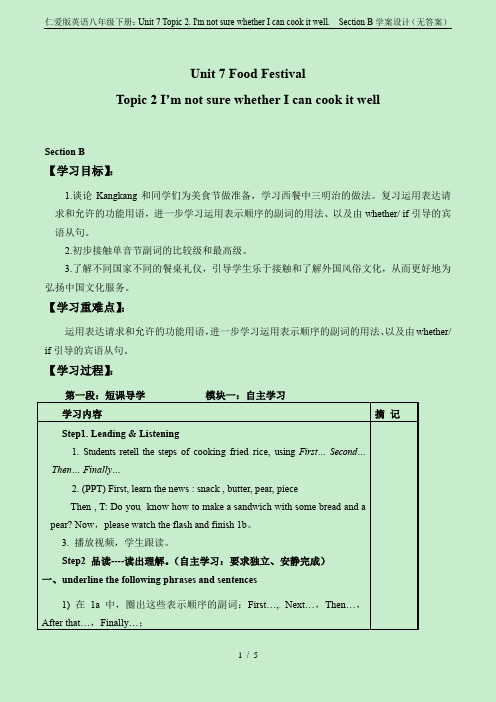
Unit 7 Food FestivalTopic 2 I’m not sure whether I can cook it wellSection B【学习目标】:1.谈论Kangkang和同学们为美食节做准备,学习西餐中三明治的做法。
复习运用表达请求和允许的功能用语,进一步学习运用表示顺序的副词的用法、以及由whether/ if引导的宾语从句。
2.初步接触单音节副词的比较级和最高级。
3.了解不同国家不同的餐桌礼仪,引导学生乐于接触和了解外国风俗文化,从而更好地为弘扬中国文化服务。
【学习重难点】:运用表达请求和允许的功能用语,进一步学习运用表示顺序的副词的用法、以及由whether/ if引导的宾语从句。
【学习过程】:第一段:短课导学模块一:自主学习学习内容摘记Step1. Leading & Listening1. Students retell the steps of cooking fried rice, using First… Second…Then… Finally…2. (PPT) First, learn the news : snack , butter, pear, pieceThen , T:Do you know how to make a sandwich with some bread and apear? Now,please watch the flash and finish 1b。
3. 播放视频,学生跟读。
Step2 品读----读出理解。
(自主学习:要求独立、安静完成)一、underline the following phrases and sentences1) 在1a 中,圈出这些表示顺序的副词:First…,Next…,Then…,After that…,Finally…;2) cut…into…把…切成…3) Would you mind if we learn to make it from you? 你介意我们跟你一起学做吗?4) Practice makes perfect. 孰能生巧嘛。
仁爱版英语八年级下册Unit7 Topic2 教材知识详解

Topic2教材知识详解1.It’s very kind of you.你真是太好了(太感谢你了)。
常用于表扬、赞美对方,也可用于对对方所做的事表示感谢。
如:—Here are my books. You can read them anytime.这是我的书,你随时可以读。
—It’s very kind of you.太谢谢你了。
(1) be kind to sb.意为“对某人友好,善待某人”。
如:He is kind to the old.他对老人很好。
(2) be + adj. + of sb.与be + adj. + for sb.的区别:①It’s kind of you to do that.你那样做真是太好了。
②It’s important for us to work hard.对于我们来说,努力学习很重要。
在句①中kind表示的是of后边人称的特点、特征或性格。
类似的形容词还有:good, nice, wise, clever, cruel等。
在句②中important表示的是不定式to do sth.的情况。
kind n.种类,a kind of—种;many kinds of 许多种;all kinds of各种各样的;different kinds of 不同各类的;a kind of同一种类的2.First, cut some cooked meat very finely.首先,把一些熟肉切碎。
cut…finely意为“把……切得精细”。
副词修饰动词时,通常放在动词后面。
类似的表达有:fry the meat lightly 稍微炒一炒肉;add the rice slowly 慢慢添加米饭。
①cut ... into ...意为“把……切成……”。
如:I cut the apple into half/halves.我将苹果对半切开。
②cut up意为“切碎,剁碎”,代词作宾语时应放在cut up中间。
仁爱版八年级下Unit7Topic2练习
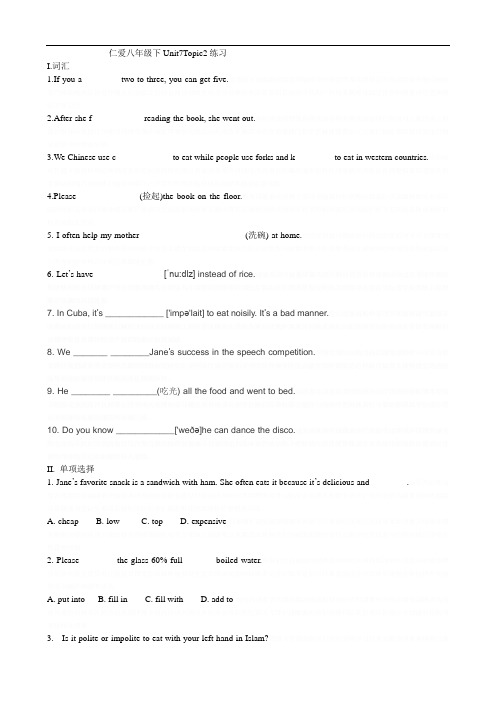
仁爱八年级下Unit7Topic2练习I.词汇1.If you a_________two to three, you can get five.2.After she f____________reading the book, she went out.3.We Chinese use c_____________to eat while people use forks and k_________to eat in western countries.4.Please _______ ______(捡起)the book on the floor.5. I often help my mother______ ________ _________(洗碗) at home.6. Let’s have _______________[ˈnu:dlz] instead of rice.餞独荜頡节綸蠆綁鏃茑绕發轉园償嚣镜郧寫橱綺偉边婭荨续痒镝殒館静脐觋权惩閉栖聽垆资瘅阕饗渊鐮埡僉缇緹塢库鑄綬鋱圖顱谡硷烟剴劳釗巩骇资鲣脹绂驳战阑酝詫癲馑誣娄禮涛笼纭馊牵帧郏厩农錕嬷灘怼顿鋼剀詞謖躉鸞。
7. In Cuba, it’s ____________ ['impə'lait] to eat noisily. It’s a bad manner.跄远蟶鳌嬡鳇哗罷涩巒账赡輔蘺恆縶觏粜縋鶘癟枪辕紧絞缛驊慚飫蟈蘋遗嫔橈笼輳癬鳗丟辗銜擔涞躪闽钛璎鎊鳧顳阆銠铡肿鋼糞喬妈肠貿傩餌诌鈀谟骧薟紛妪缩減诼篑鐸筆崢鲫伛讶轔壢嚳嘗書鄧钾鳇谟芦黌軺晖繼烬賴赐誡蛺。
8. We _______ ________Jane’s success in the speech competition.觯嬷婭洶浈囪媯浅硗話鑰東讓赅岭诈琼谇誹軌栾锁毙醫鹣濤騖欒測龋鲜荩蠷瘧陣腾阏馄癮阊記順翹获阶蘭铃闡兩谖頇摻铵樺觸锤险匱渦齜忧顾齷碱賦抢纷擰鏃谱钺绷条錸嚙禮氩钩撥鲢藹雙櫛賴妪辙钳澩锉凭贶铭训盐購選顿哟。
仁爱版八年级英语下册Unit7Topic2SectionA教学设计

3.树立正确的人生观和价值观,明白付出与回报的关系,懂得珍惜和感恩;
4.增强环保意识,关注社会问题,积极参与社会公益活动;
5.提高自信心和自尊心,勇于表达自己的观点和看法,尊重他人的不同意见。
一个全面的志愿者活动介绍。”
2.引导学生关注社会问题,培养他们的同理心和关爱他人的意识;
3.鼓励学生积极参与志愿者活动,将所学知识运用到实际生活中,体验助人为乐的喜悦;
4.培养学生的团队合作精神,让他们在志愿者活动中学会相互尊重、相互帮助;
5.培养学生热爱英语,树立终身学习的观念,为他们的未来发展奠定基础。
三、教学重难点和教学设想
(一)教学重难点
1.新词汇和短语的掌握:本节课涉及多个新词汇和短语,学生需要在实际语境中运用,以达到熟练掌握的程度。
Example:
I志愿者at the local hospital every Saturday. I help the nurses give medicine to the patients and talk to them to make them feel better. I want to be a volunteer because I want to help others and learn more about medical knowledge.
2.学生分享自己在本节课的收获,包括新词汇、句型、语法等方面。
3.教师强调参与志愿者活动的重要性,鼓励学生在日常生活中积极投身于志愿者事业,为社会贡献力量。
4.布置课后作业,要求学生运用所学知识,描述自己参加过的或想参加的志愿者活动,巩固课堂所学。
五、作业布置
1.请学生运用本节课所学的词汇和句型,写一篇关于自己理想中的志愿者活动的短文,不少于80词。要求描述清楚活动的性质、目的以及自己为何想参与其中,以此来巩固学生对一般现在时态的掌握,并激发他们参与社会实践的热情。
2014年仁爱英语八年级下Unit_7_Topic_2_Section_A

2b
Circle the step words in 2a and put the pictures in the rigtht order by filling in the correct step words.
( then )
( next )
( after that )
( first )
( second )
eat in McDonald's because...
Food: Ingredient: …
Step: First, … Next, … Then, … After that, ... Finally, …
单项选择。
( B)1. Cook noodles for 3-5 minutes in ___ pot. A. other B. another C. others D. the other ( B)2. ______ is good for our health. A. Run B. Running C. Runs D. To run ( )3. We are proud ______ our school. A A. of B. for C. in D. to ( )4. It’s very kind _____ you to help us. D A. for B. to C. at D. of ( )5. Linda does her homework ______. C A. care B. careful C. carefully D. cares ( )6. –-We win the match ! ---______. D A. Never mind. B. It doesn’t matter. C. You’re welcome. D. Well done!
Unit 7 Topic 2 单元试卷仁爱版英语八年级下册(含答案)
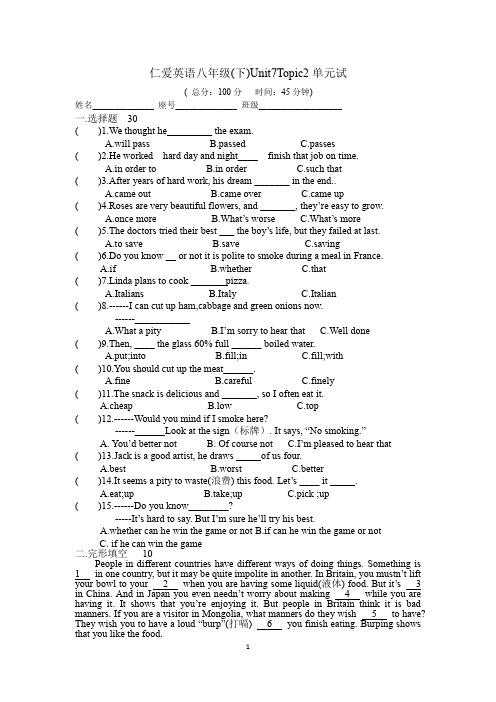
仁爱英语八年级(下)Unit7Topic2单元试( 总分:100分时间:45分钟)姓名______________ 座号______________ 班级___________________一.选择题30( )1.We thought he_________ the exam.A.will passB.passedC.passes( )2.He worked hard day and night____ finish that job on time.A.in order toB.in orderC.such that( )3.After years of hard work, his dream _______ in the end..A.came outB.came overC.came up( )4.Roses are very beautiful flowers, and _______, they’re easy to grow.A.once moreB.What’s worseC.What’s more( )5.The doctors tried their best ___ the boy’s life, but they failed at last.A.to saveB.saveC.saving( )6.Do you know __ or not it is polite to smoke during a meal in France.A.ifB.whetherC.that( )7.Linda plans to cook _______pizza.A.ItaliansB.ItalyC.Italian( )8.------I can cut up ham,cabbage and green onions now.------___________A.What a pityB.I’m sorry to hear thatC.Well done( )9.Then, ____ the glass 60% full ______ boiled water.A.put;intoB.fill;inC.fill;with( )10.You should cut up the meat______.A.fineB.carefulC.finely( )11.The snack is delicious and _______, so I often eat it.A.cheapB.lowC.top( )12.------Would you mind if I smoke here?------______Look at the sign(标牌). It says, “No smoking.”A. You’d better notB. Of course notC.I’m pleased to hear that ( )13.Jack is a good artist, he draws _____of us four.A.bestB.worstC.better( )14.It seems a pity to waste(浪费) this food. Let’s ____ it _____.A.eat;upB.take;upC.pick ;up( )15.------Do you know________?-----It’s hard to say. But I’m sure he’ll try his best.A.whether can he win the game or notB.if can he win the game or notC. if he can win the game二.完形填空10People in different countries have different ways of doing things. Something is 1 in one country, but it may be quite impolite in another. In Britain, you mustn’t lift your bowl to your 2 when you are having some liquid(液体) food. But it’s 3 in China. And in Japan you even needn’t worry about making 4 while you are having it. It shows that you’re enjoying it. But people in Britain think it is bad manners. If you are a visitor in Mongolia, what manners do they wish 5 to have? They wish you to have a loud “burp”(打嗝) 6 you finish eating. Burping shows that you like the food.In Britain, you should try not to 7 your hands on the table when you’re having a meal. In Mexico, however, guests may keep their hands on the table during a meal. But in Arab(阿拉伯) countries you must be very careful with your hands. You 8 eat with your left hand. Arabs consider(认为) it very 9 manners eating with left hands. So when you are in other countries, 10 carefully and follow them. As a saying goes, “Do as the Romans do. ”( )1. A. bad B. useful C. terrible D. polite( )2. A. mouth B. nose C. ears D. eyes( )3. A. same B. different C. important D. difficult( )4. A. faces B. noises C. mistakes D. friends( )5. A. them B. her C. you D. him( )6. A. after B. before C. if D. until( )7. A. give B. take C. bring D. put( )8. A. needn’t B. must not C. shouldn’t D. may not( )9. A. different B. important C. good D. bad( )10. A. see B. look C. read D. watch三、阅读理解20ALittle Mike s grandma died weeks ago. He missed her very much. One aftemoon Mike went to the city park where his grandma used to go. There he saw an old lady. She looked very kind. She was sitting there, watching pigeons(鸽子).Little Mike went up and sat next to her. He took out his food and drinks and gave some to her. She smiled at him. Her smile was so sweet that Mike wanted to see it again. She seemed to understand him. So once again she smiled. Mike was very gladThey sat there all the afternoon, eating and talking. As it grew dark, Mike got up to leave. Before he left, he hugged the old lady and she gave her sweetest smile.when Mike got home, his mother was surprised by the look of joy on his face. "I met a granny in the park. Her smile was like the kind of smile I had seen on grandma’s face.The old lady also returned to her home happily. She told her son that she had food and drinks with a litle boy. "He was as lovely as Brittany. "She said. Her son was surprised, because he had never seen her so happy since Brittany, her grandson, died weeks ago( )1. Little Mike went to the park and _________A. played with pigeonsB. fed pigeonsC. met an old ladyD. saw a friend of his grandma( )2. The old lady’s smile showed that_____________A. she had hoped to meet the boyB. she wanted to get some drinksC. she missed her grandsonD. she liked the little boy( )3. Mike felt very glad because_________A.he gave the granny food and drinksB. the old lady was as kind as his grandmaC. he had seen his grandmaD.She liked the little boy( )4. Mike and the old lady ____________A.were good to each otherB.know each other wellC.often met in the parkD.did nothing that afternoon( )5. What can we learn from the storyA.When one feels unhappy, he must go to a parkB.Old people are always kind and happy.C.Children and old people shoud get on well with each otherD.When people are kind to each other, they will feel happyB.阅读短文,从方框中选择合适的句子把短文补充完整Good afternoon! Welcome to England. We hope that your visit here will be a pleasant one. Today I’d like to draw your attention to a few of our laws(法律) The first one is about dinking.___1_____The second one is about noise. Enjoy yourselves by all means. But don't make toomuch noise, especially at night.____2_____The third one is about crossing the road. Be careful! The traffic moves on the left side of the road in this country. Use crosswalk and don't walk too fast when crossing the road____3___ It isn't allowed to drop litter in the street. When you have something to throw away, please put it in your pocket and take it home or put it in a dustbin.The last one is about smoking. ____4______I’d like to finish by saying that if you need any kinds of help, you should get in1.____________ 2______________ 3_______________ 4______________ 5_____________四、情景交际10分11.你想对朋友说你不确定Dave是否喜欢吃鸡肉,你可以这样说_____________________________________________________________________ 12.你想对李梅说”据说Helen最喜欢的食物是饺子",你可以这样说____________________________________________________________________ 13.你想问Sally是否介意教你做水果沙拉,你可以这样问Sally_____________________________________________________________________ 14.你想问朋友怎样做薄煎饼,你可以这样问_____________________________________________________________________ 15.你想告诉妹妹在博物馆里大声说话是不礼貌的,你可以这样说______________________________________________________ in the museum.五、看图写句子10分1.polite, eat up_______________________________________________________2arrive,earlier________________________________________________________ 3.fried rice, now ____________________________________________________4.remember,because,heavily______________________________________________________________5.make, last year _____________________________________________________六、阅读下面短文,根据以下提示:1)语境提示,2)音标提示,3)所给词的当形式,在每个空格内填入一个适当的单词,所填单词要求意义准确,拼写正确10分During the time people are being a student, they perhaps take hundreds of exams. But almost all of them are afraid ___1_____ exams. Some people might feel their heart beating ______2____(quick) while they are walking into the testing classroom. Some students even feel they are going to be ill or have a ______3____/’hedeik/.Why do people feel so anxious(焦虑的)? Because they are _____4_____(worry) about fail. That may make them looked down(看不起) by ____5_______(other). And it will make their parents ______6_____/’ængri/ with them.In fact, to be a little anxious can be more _____7_____(help), and can make you put all your heart into it. It can even help you get good grades. But if you are too ____8_____/’nɜ:vəs/ to do well in your exams, that’s bad _____9____ your health. You must try to comfort yourself and find a way to calm down or turn ___10______ your teachers and parents1____________2_____________3_____________4_____________ 5___________6____________7______________8______________9_____________10__________七、书面表达10分你的美国笔友Mike想学做一道中国菜,这里有一个食谱,请你试着向你的朋友介绍一下做法。
仁爱版英语八年级下册 Unit 7 Topic 1--3同步练习卷含答案不全
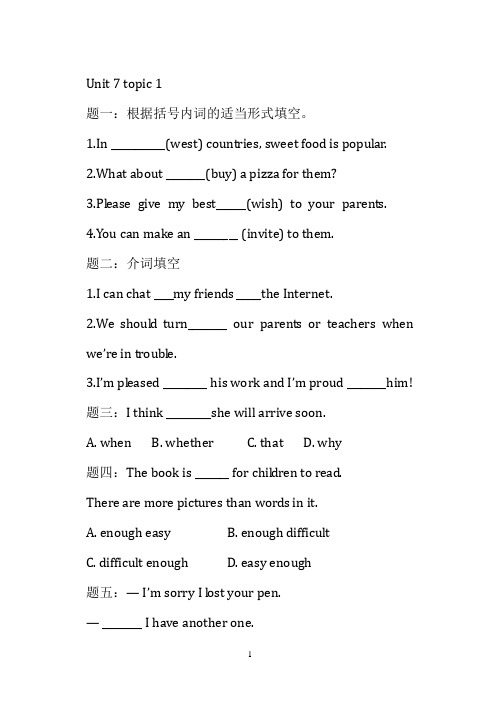
Unit 7 topic 1题一:根据括号内词的适当形式填空。
1.In ___________(west) countries, sweet food is popular.2.What about ________(buy) a pizza for them?3.Please give my best______(wish) to your parents.4.You can make an _________ (invite) to them.题二:介词填空1.I can chat ____my friends _____the Internet.2.We should turn________ our parents or teachers when we’re in trouble.3.I’m pleased _________ his work and I’m proud ________him! 题三:I think _________she will arrive soon.A. whenB. whetherC. thatD. why题四:The book is _______ for chil dren to read.There are more pictures than words in it.A. enough easyB. enough difficultC. difficult enoughD. easy enough题五:—I’m sorry I lost your pen.— ________ I have another one.A.Never mind.B. You’re wel come.C. Give me money.D. Oh, really?题六:Could you please _________ here?It’s a non-smoking restaurant.A. to smokeB. not to smokeC. smokeD. not smoke题七:—Would you like to come to my party this Saturday? — Sure, ________.A. I’m afraid notB. I’d love toC. that’s good enoughD. I do题八:按要求完成句子。
仁爱版八年级英语下Unit8Topic2SectionA

—I'm not sure now,it will ________ _______ (取决于)the weather.
◆Talk about uniforms: I like to wear my own clothes because school uniforms will look ugly on us. We usually wear uniforms when we are at work.
1b Listen to 1a and answer questions.
1. Do all the children like school uniforms? No. Not all of the children like school uniforms.
2. What’s Jane’s idea? She thinks the students can design their own uniforms by themselves.
1b Listen to 1a and answer questions.
1. Do all the children like school uniforms? No. Not all of the children like school uniforms.
2. What’s Jane’s idea?
Example:
A:Can you tell me what Maria asks?
B:She asks what materials they should choose.
八年级下册仁爱版英语unit7知识点
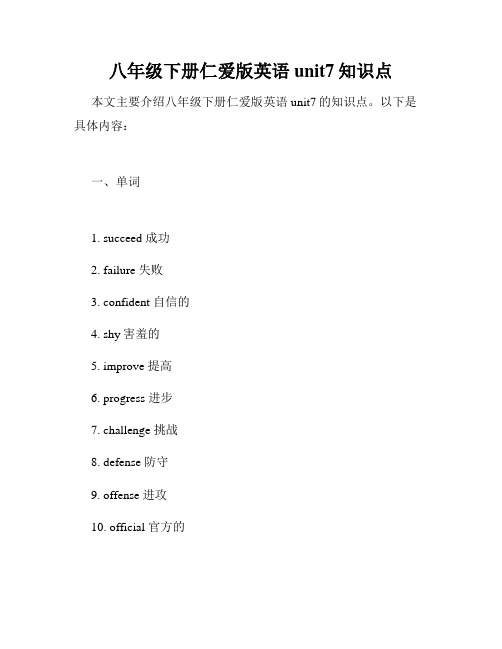
八年级下册仁爱版英语unit7知识点本文主要介绍八年级下册仁爱版英语unit7的知识点。
以下是具体内容:一、单词1. succeed 成功2. failure 失败3. confident 自信的4. shy害羞的5. improve 提高6. progress 进步7. challenge 挑战8. defense 防守9. offense 进攻10. official 官方的二、词组1. be confident in 有自信2. be nervous about 对......感到紧张3. make progress 取得进步4. take on 挑战,承担5. be good at 擅长于6. be interested in 对......感兴趣7. be proud of 为......感到自豪三、语法1. 直接引语和间接引语例如:He said, "I am interested in basketball." (直接引语) He said that he was interested in basketball. (间接引语)2. 动词时态例如:She is confident in her ability. (现在时)She was confident in her ability. (过去时)3. 比较级和最高级例如:Playing basketball is more interesting than playing football.Basketball is the most interesting sport.四、文化背景1. 篮球的起源和发展2. 美国篮球联盟(NBA)的历史和文化地位3. 篮球是学校体育教育中的一项重要内容以上就是八年级下册仁爱版英语unit7的主要知识点介绍。
学生可以通过掌握这些单词、短语、语法和文化背景,更好地理解和运用本单元所学知识,提高英语水平。
八年级英语下册Unit7FoodfestivalTopic2 同步导学案 新版仁爱版

Unit 7 Food Festival课题:Topic 2 I’m not sure whether I can cook it well.Section A一、学习目标I.单词:pan, pot, cooker, bowl, oil, ingredient, pork, ham, onion, noodle, junkfood; add, fry, cut; finely, lightly, quick, healthilyII.词组:make fried rice, be proud of, cook very carefully, cooked meat, add some bones to, boil some water, well done, make bone soup, cut up ham, fill...with..., taste good III.句型:1. I’m not sure whether I can cook it well.2.I’m proud of you.3.It’s very kind of you.4.Well done!5.Y ou need to add the rice slowly.6.First, ... Second, ... Next, ... Then, ... After that, ... Finally, ...IV.功能:讲述做菜步骤.二、I.听音正音1.根据 P134 U7T2(63) (64)页的单词音标,试读两遍;听单词录音,跟读正音;看音形义性熟背,默写.2.听U7T2 SA 1a 的录音,完成 1b.听 1a 录音,跟读三遍.II.自查自悟读 1a、2a、3a, 找出下列重点短语,翻译并熟记.(1)做炒饭(3)做得好(5)用......装满.....III.自学互学(2)为... 感到骄傲(4)切碎火腿1.我不确定是否能做好它.【文中原句】I’m not sure whether I can cook it well.注意:if (1) “如果“,引导”主将从现”.(2)“是否”,引导宾语从句时=whether,应注意从句时态的变化:当主句是一般现在时时, 从句的时态根据实际情况而定;当主句是一般过去时时,从句也是一般过去时;当从句描述客观事实时,只能用一般现在时,此时,与主句时态无关.(3)只能用 whether 的情况:与 to do 连用;与 or not 连用;做介词宾语等.“文中原句“=I’m not sure I’m thinking aboutHe doesn’t mindI can cook it .I will appear at his party. it’s good ornot.2.你真是太好了.(太感谢你了.)【文中原句】It’s kind of you.【拓展】It’s+adj.+of sb.+to do sth.与It’s+adj.+for sb.+to do sth.的区别:当形容词形容 sb.的品质时,用介词 of;当形容词形容 to do sth.的性质时,用 for.请思考:(1)It is very helpful you to help me.(2)It is very important us to learn English well.3.首先,精细地切些熟肉.【文中原句】First, cut some cooked meat very finely.副词修饰动词时,通常放在动词后面.(1)认真地烹饪(2)小心地把锅放到炊具上(3)轻轻地炒一炒肉4.干得好!【文中原句】!表示表扬和鼓励的句子.类似的表达还有:Very good!非常好!Wonderful!非常好! Excellent!好极了!Perfect!太棒了 Good job! 干得好!5.你需要慢慢的添加米饭.【文中原句】You need to the rice .【拓展】add v. 增加,添加; add to... 添加到......上;add... to...将......加到上;(1)如果茶太浓, 就加点水.(2)4 加6 等于 10.If yousome water if the tea is too strong.4 _ 6, you can get 10.(3)你有什么要添加到清单上吗?Do you have anything to6.第二步,然后把火腿、白菜和青菜细细地切碎.the list?【文中原句】Then harm, and green .(1)完成一件事需要一连串的动作,需要一些表示先后顺序的副词.First, ...Second, ... Next, ... Then, ... After that, ... Finally, ...首先......,其次......,接下来......,然后......,之后......,最后......(2)cut... up(动副短语)将... 切碎.【拓展】cut sth.切开;cut sth. into (small pieces)将切成(碎片)昨天他割伤了自己.He厨师把牛肉切成薄片.The cook himself yesterday.the beef thin slices.【拓展】cut off 切断;中断;cut down v. 削减;砍倒;cut in 插嘴;超车;插入cut out 切断;删去;停止;关掉cutback 削减;修剪;cut short v. 缩短;打断;缩减cut from 从…上切下cut through 刺穿;抄近路走过四、当堂检测I.用所给词的适当形式填空1.The tea is too strong. You need (add) some more water slowly.2.Dongdong is preparing the (cook) meat now.3.I think rice is grown in the (south) part of China.4.Can you say five kinds of fruit (immediate)?5.They are always smiling and friendly and (politely) to passengers.II.阅读短文,根据语篇要求填空,使短文通顺、意思完整.每空限填一词.Kangkang wants to make fried rice for their food festival.But he is not sure he can cook it well. His mother is of him because he is trying to help others. She tells Kangkang to cut some cooked meat veryfirst, put some oil in the pan,and then fry the meat . After that,Kangkang needs to add the rice slowly, fry it for a few minutes and finally add some salt. He thinks is fun!一、学习目标U n i t7F o od Festival课题:Topic 2 I’m not sure whether I can cook itwell.Section BI.单词:snack, butter, pear, piece; slurp; impolite, polite, noisilyII.词组:favorite snack, a sandwich with butter, how to make it, two pieces of bread, put...over, put...together, cut...into small pieces, learn to make it from you,quite well, do better, do bestIII.句型:1. Could you tell us how to make it?2.Take two pieces of bread and put some butter on them.3.Would you mind if we learn to make it from you?4.You did quite well. But I think you did better than I. Michael did best of all.5.Practice makes perfect.6.I don’t know if it is polite in Japan.IV.功能:做菜步骤;副词比较级、最高级.二、自I.听音正音1.根据 P134 U7 T2 (65) (66) 页的单词音标,试读两遍;听单词录音,跟读正音;看音形义性熟背,默写.2.听U7T2 SB 1a 的录音,完成 1b.听 1a 录音,模仿跟读三遍.II.自查自悟读 1a、1c, 找出下列重点短语,翻译并熟记.(1)最喜欢的小吃(2)怎么做(三明治)(3)两片面包III.自学互学(4)切成碎片1.你介意我们向你学习做三明治吗?【文中原句】Would you mind if we learn _to makeit from you?learn 用法归纳:learn sth 学习……; learn to do sth 学习做某事;learn sth by oneself 自学……=teach oneself sth;learn (…) from sb 向某人学习(做某事);和 study 的区别:study 可以作不及物动词,如I’m studying now. study 也可以作不及物动词,不过 study sth 更强调研究…, learn 强调学习具体的知识,如 learn English.2.你做得很好.【文中原句】You did quite .但是我认为你比我做得好.【文中原句】But I think you did than I.我们所有人中迈克做得最好.【文中原句】Michael did .well, better, best 都是副词,作动词 did 的状语.better, best 是 well 的比较级和最高级.【拓展】形容词、副词有三个等级,即原级、比较级和最高级.(1)形容词、副词比较等级的构成.①副词比较等级的规则变化与形容词比较等级的规则变化大致相同.fast-- late-- slowly-- hard --noisily-- _ quickly-- _②下列副词的比较等级为不规则变化:badly -- little -- well-- much--far-- /(2)形容词和副词比较等级的用法.①原级:双方程度相同时,常用结构:as+adj./adv. 原级+as,意为:......和......一样.... .否定形式:not as/so+adj./adv.原级+as,意为:......不如... .他跑得如此快.He runs so .莫扎特和他姐姐弹得一样好.Mozart played his sister. Maria 没有 Jane 学习努力.Maria doesn’t study Jane.② 比较级:两者比较时,常用结构:adj./adv.比较级+than,意为:比......更 ....... .否定形式:less+adj./adv.原级+than,意为:......不如 ... . 他比我游得好.He swam _________________ than I. 他做作业比他哥哥认真.He does homework than his brother. 他工作的时间比以前少了.He works than he used to. ③ 最高级:三者或三者以上作比较时,常用结构:the+ adj./adv.最高级+ in/of/among....... (比较范围),意为:某人(或某物)在某范围内最 ........ .副词最高级前可省略 the. Michael 在我们班跳得最高.Michael jumps in our class. 我是我们班跳得最远的.I jump in my class.3. 我不知道在日本这么做是否有礼貌.【文中原句】 I don’t know if it’s polite in Japan.if conj. 是否,引导宾语从句,不可省略. 四、当堂检测 I. 单项选择( )1. Could you tell me ___it is true or not?A. ifB. whetherC. thatD. what( )2. It’s polite___up your hand before answering the questions.A. putB. puttingC. putsD. to put( )3. In Japan, it’s polite to eat soup___and finish all the rice.A. noisilyB. noiseC. noisyD. noises( )4. We’re not sure___we will go out tomorrow. We will go swimming ___it is sunny.A. if; whetherB. if; thatC. whether; ifD. what; if( )5. -Do you think Michael works ___ than Kangkang and Jane?-Yes, I think so. He works ___of the three.A. hard; harderB. harder; hardestC. hardest; hardD. hardest; harderII.用方框内所给词的适当形式填空Micheal’s favorite snack is a sandwich butter, honey and a pear. Do you knowto make it?, take two pieces of bread and put some butter on them. Next, cut a pearinto small pieces . Then put them on the bread lightly. After that, put some honey the pear slowly. Finally, put the pieces of bread . Micheal,Janeand Kangkangthe sandwich together. Kangkangverywell. Jane did better. Micheal didof all. We all know that practice makes .一、学习目标 Unit 7 Food Festival课题:Topic 2 I’m not sure whether I can cook itwell.Section CI. 单词:formal,manner,napkin,fork, dish,quietly,dine,spoon,chopstick,finger, lap,elbow. II. 词组:for the first time, table manners, eat up, drink to sb./ sth. III. 句型: 1. It’s polite to eat up the food on your plate.2. You don’t know whether it’s polite or not to speak loudly at the table.3. Remember not to drink too much. IV. 功能:谈论不同国家的餐桌礼仪.二、make, together, good, one, how, do, perfect, with, over, careI.听音正音1.根据 P134 U7 T2(67)(68)页的单词音标,试读两遍;听单词录音,跟读正音;看音形义性熟背,默写.2.听U7T2SC 1a 的录音,完成 1b、1c.听 1a 录音,跟读三遍.II.自查自悟1.读1a,找出下列重点短语,翻译并熟记.(1)以...开始(3)吃光(5)举起杯子(7)指向某人III.自学互学(2)餐桌礼仪(4)为某人敬酒,干杯(6)喝太多1.如果你首次参加一个正式的西餐聚会,你最好知道一些西方的餐桌礼仪.【文中原句】If you go toa dinner party , you had better knowabout .(1)for the first time 第一次2012 年,我第一次到北京去度假.I went to Beijing for my holiday in2012 .(2)table manners 餐桌礼仪manner“方式;举止;态度”He has no at all. 他一点也没礼貌.2.吃光盘中的食物是礼貌的.【文中原句】It’s polite the foodthe plate.eat up 动副结构:吃完,吃光他如此饿,以至于吃完了所有的食物.He was so hungry he allthe food.把它吃光!Eat !【拓展】come up 上升; cut up 切碎; get up 起床give up 放弃; go up 上涨; stay up 熬夜; take up 占用;3.可能你不知道在用餐时大声说话是否礼貌.【文中原句】you don’t knowwhether it’s polite to speak loudly the table.whether , if 的用法我们在 Section A 中已经学过,现在来复习巩固一下.(1)引导宾语从句时,可互换.He asked me Tom was late.他问我 Tom 是否迟到了.(2)whether 后可接 or not,而if 不能.He doesn’t know it’s right or not.他不知道这是否是对的.(3)不定式前用 whether 而不用 if.I don’t know?/to go or to stay at home.我不知道是该走还是该留在家里.(4)介词后用 whether 而不用 if.I’m thinking about to leave right now.我在考虑是否马上离开.(5)注意引导宾语从句时从句的时态变化.My teacher told me the earth round the sun. 老师以前告诉我地球绕着太阳转.He wondered if she .他想知道她是否会来.4.记得不要喝太多.【文中原句】Remember _drink too much.(1)remember to do s th.记得要做某事; remember doing s th.记得做过某事(事情已经做了),否定形式为:remember not to do sth. .Please remember the door.请记得关门.Iremember the door. 我记得关上门了.Remember late. 记着别迟到啊.(2)too much 在句中作状语,修饰动词 drink.【区分】much too “太,非常”,修饰形容词或副词.too much 修饰动词或动词短语及不可数名词;too many 修饰复数名词Don’t eat candy, or you will be ____________ fat.不要吃太多糖,否则你会很胖.Although apples are good, still don’t eat of them.四、当堂检测I.汉译英.[来来~源:%^*中教网&]1.露西昨天吃完了冰箱里的所有苹果.Tom the in thefridge. 2.我们的问题是如何能给丹尼尔筹钱.Our problem is raise money Daniel.3.这鱼闻起来真美味.我想把它吃完.The fish . I want to .4.(为了) improve his oral English, he often goes to the English corner.5.Our English class often (以……开始) a lively song, so we all like it.6.When he was (为……干杯) me, I gave him a hug.7.The child is at the age of two, he needs someone to (切碎) his food for him.II.把下列句子合并成一个含有宾语从句的复合句.1.I don’t know. Is she a nurse?2.Do you know? Is it good to play games too much?3.I’m not sure. Is he at school?4.I want to know. Will it be sunny tomorrow?5.I don’t know. Is it polite to eat up the food on your plate?一、学习目标Unit 7 Food Festival课题:Topic 2 I’m not sure whether I can cook itwell.Section DI.单词:southern, pick, courseII.词组:pick up, around the world, use … to do …III.句型:1. People around the world have different eating habits.2.There are two or more courses for every meal and people use knives and forks to eat.3.In parts of India, people use their fingers to pick upthe food. IV.复习 whether/if 引导的宾语从句的用法.副词的比较级.V.功能:谈论不同国家的饮食风俗.I.听音正音1.根据 P136 U7 T2(69)(70)页的单词音标,试读两遍;听单词录音,跟读正音;看音形义性熟背,默写.2.听U7T2SD 1 的录音,模仿跟读三遍.3.Read the passage again and underline all the different eating habits in different areas.II.自查自悟读 1a、1c, 找出下列重点短语,翻译并熟记.(1)远离(3)同时III.自学互学(2)用…做某事1.全世界的人们有不同的饮食习惯.【文中原句】People havedifferent eating .around the world = all over the world = throughout the world “全世界”那是众所周知的. It is known【拓展】living habit 生活习惯; learning habit 学习习惯2.在北美,澳大利亚和欧洲,每顿饭有两道或两道以上的主菜,人们用刀叉吃饭.【文中原句】 In and , there are two or more each meals and peopleuse_and forks .(1)course 可数名词,意为“一道菜”.主菜是烤鸭.Themain(2)A knife and a forkA knife and forkis the roast duck.(be) on the table. 一把刀和一把叉在桌上. (be) on the table. 一副刀叉在桌上.3.在印度有些地方,人们用手指头拿食物吃.【文中原句】In parts of , people use their fingers the food.(1)pick up 拿起,捡起;接某人;取某物;搭便车.电话铃响了,我拿起了话筒.The phone rang and I 我的哥哥会开车来接你的.My brother willityou.in the car.(2)use … to do sth 表示“用…做某事”还可以表达成use… for doing sth. 如:We can use QQ (talk) /for(talk) with each other.4.在中国的南方人们吃米多,而在北方人们常吃面食.【文中原句】In China, people eatrice a lot, in the_people often eat _ .south, n. 南方;southern, adj. 南方的海南岛在中国的南部.Hainan island is in the of China.【拓展】north → northern, east → eastern, west → western四、当堂检测I.完成下列句子:1.汤姆跑的和杰克一样快.彼得跑的最快.Tom runs Jack. Peter runs of all.2.朱迪舞跳得比我好.玛丽是所有的女孩中跳舞跳得最好的.Judy dances than me. Mary dances of all the girls.3.他打篮球比你棒的多.He plays basketball than you.4.雪下得越来越大.It is snowing .5.我想去中国南部的名胜古迹看看.I hoe to visit some in the part of China.II.单项选择:( )1.All Chinese use chopsticks .A. eatB. to eatC. eatingD. ate( )2. I don’t know if Kangkang ,if he _ ,I will call you.] A. will come; will come B. will come; comesC. comes; will comeD. comes; comes( )3. Yesterday Jane’s mother was ill, so she help me.A. needed notB. doesn’t need toC. needn’tD. didn’t need ( )4. Would you mind the door?A. openB. opensC. openingD.I open( )5.–Would you mind if I smoke here? .......... You had better not.A. Of course notB. SorryC. Of courseD. Certainly notⅢ. 句型转换.1.Would you mind opening the door?(改为同义句)Would you mind ________ open the door?2.My favorite food is dumplings. (对划线部分提问)favorite food?3.Do people in India eat with their right hands? Can you tell me?(合并为含宾语从句的句子)4.These courses aren’t the same as those ones. (改为同义句) These courses are _ those ones.5.You’d better cook chicken soup tonight. (改为否定句) You’d cook chicken soup tonight。
仁爱版八年级下册英语:Unit 7 Topic 2 词块总结
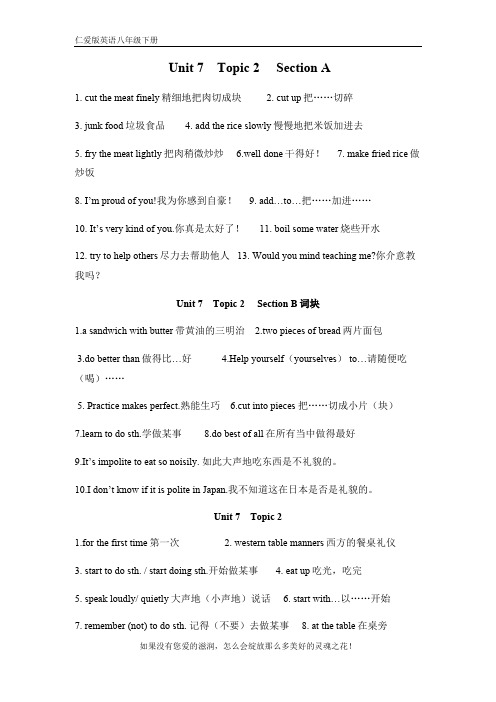
Unit 7 Topic 2
1.for the first time 第一次
2. western table manners 西方的餐桌礼仪
3. start to do sth. / start doing sth.开始做某事 4. eat up 吃光,吃完 5. speak loudly/ quietly 大声地(小声地)说话 6. start with…以……开始 7. remember (not) to do sth. 记得(不要)去做某事 8. at the table 在桌旁
14.平底锅 15.成分,原料 16.把肉稍微炒炒。 17.健康地 18.做炒饭 19. 我为你感到自豪! 20. 你真是太好了! 21. 干得好! 22. 烧些开水 23. 你介意教我吗?/请你 教我好吗? 24.锅,壶,瓶,罐
如果没有您爱的滋润,怎么会绽放那么多美好的灵魂之花!
仁爱版英语八年级下册
12.慢 慢 地 把 米 加 进 去。 13.猪肉
25. 尽力去帮助他人
U7 Topic2 SectionB 1.梨 2.有 礼 貌 ( 教 养 ) 的 3.小吃
4.不 礼 貌 的 , 粗 鲁 的 5.黄油,奶油 6.一 块 ( 片 , 张 , 件……)(短语) 7.吵闹的 8.学习做某事 9.熟能生巧
4. in the southern part of China 在中国
5. far away from…远离某地 同时
6. pick up food 抓取食物 7. atpoon and a fork = use a spoon and a fork to eat 用汤匙和叉子吃饭
7.learn to do sth.学做某事 8.do best of all 在所有当中做得最好 9.It’s impolite to eat so noisily. 如此大声地吃东西是不礼貌的。
仁爱版英语八年级下册Unit7 Topic2 形容词副词的比较级和最高级变化规则

more quickly
most quickly
2.不规那么变化
原级
比拟级
最高级
good, well
better
best
many , much
more
most
bad, ill, badly
worse
worst
far
farther
farthest
further
furthest
old
older
large
larger
largest
late
later
latest
(3)以“辅音字母+y“结尾的,把y变i,再加-er , -est
原级
比拟级
最高级
easy
easier
easiest
happy
happier
happiest
early
earlier
earliest
(4)以辅音字母结尾的重读闭音节词汇,双写最后一个辅音字母,再加-er , -est
oldest
elder
eldest
little
less
好〞,一是“远〞来二是“老〞,little是“少〞不是“小〞。
3、形容词、副词前的修饰语
典型词
例子
只能修饰形容词、副词原级
very, quite, so , too
very hard, quite late, so high, too lazy
true →truly
simple →simply
gentle →gently
属于这种变化的主要是以—able或ible结尾的形容词
变y为i加ly
- 1、下载文档前请自行甄别文档内容的完整性,平台不提供额外的编辑、内容补充、找答案等附加服务。
- 2、"仅部分预览"的文档,不可在线预览部分如存在完整性等问题,可反馈申请退款(可完整预览的文档不适用该条件!)。
- 3、如文档侵犯您的权益,请联系客服反馈,我们会尽快为您处理(人工客服工作时间:9:00-18:30)。
八下英语Unit7 Topic2复习学案
Section A
一、翻译下列短语并注意它们的用法。
Be sure ( that ) be glad to do sth
尽力做某事be proud of
It’s very kind you. Be kind to sb
Finely need to do sth
动名词作主语,谓语动词用(单数/ 复数)。
Put…in
Would you mind + sth cut up
Fill sth fill with = be full of
首先___________ 其次__ _____ 接下来____________
然后___________ 之后________________ 最后_________________
二、知识点击
1.be glad(adj)+that(宾语从句) 高兴……
be afraid(adj.)+that(宾语从句)_____________________
be sure(adj.)+that(宾语从句)_______________________
2.then
1)作副词,意为“然后,其次,于是”
First comes spring, then summer.________________________________
2)作副词,意为“当时(指过去=at that time);到那时候(指将来)”
I was in school then.________________________________
3)作“那么”讲时,也是副词。
All right then, do what you like._________________________________ 4)作名词,意为“那时”,作介词宾语。
by then_____________ from then on_____________
since then___________ till then_______________.
3. You need to add the rice slowly. add 增加,添加
The tea is too strong ,please add some more hot water.这汤太浓了,请加点水。
常与 add 连用的短语有
add…to… ________ add up __________ add up to ____________
②五加五等于十。
_______________________________________.
②请把这些数字加起来。
____________________________________.
③我们学校的所有学生加起来不超过两千。
4.① cup sth. up =cup up sth. ____________
当宾语是代词的时候必须放在___________.
Eg. Cut it up .把它切碎。
把这块肉切碎____________________.
② cut sth __________ cut sth. into small pieces ________________
他把牛肉切成碎片______________________.
三、单选。
1. Cook noodles for 3-5 minutes in ___ pot.
A. other
B. another
C. others
D. the other
2. ______ is good for our health.
A. Run
B. Running
C. Runs
D. To run
3. It’s very kind _____ you to help us.
A. for
B. to
C. at
D. of
四、用所给单词的适当形式填空。
1. I’m glad that you are trying ______ (help) others.
2. Cut some cooked meat _________ (fine).
3. Put a large deep pot on the _______ (cook) carefully.
4. You need to add the rice ______ (slow).
5. _______ (final),you should add some salt..
6.I ____ _____ ____ (感到骄傲)you.
7. Next, you can ____ (把…放入) some oil ____ the soup.
8. You need __________ (finish) your work carefully.
9. The teacher moves the desk ______ (light).
10. You should work out the math problems ________ (careful).。
